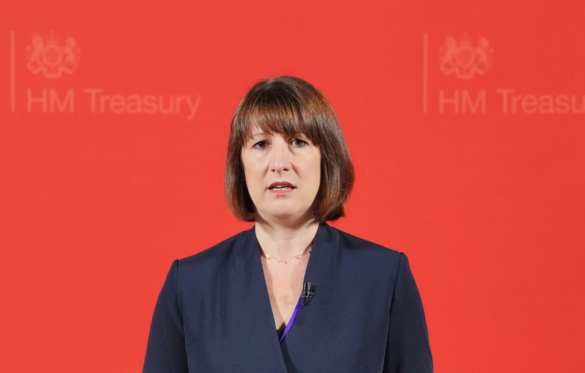UK Chancellor Rachel Reeves has hinted at a potential hike in National Insurance contributions for businesses, sparking widespread anticipation among business leaders. Reeves provided the clearest signal yet that while the Labour government remains committed to not increasing National Insurance for “working people,” the same may not apply to the portion paid by employers. As the country prepares for the upcoming Budget announcement, all eyes are on the government’s next economic moves, particularly in light of the looming tax decisions.
Clarification on Labour’s Tax Policy
Rachel Reeves’ comments have raised questions about Labour’s pre-election pledge not to increase National Insurance. She emphasized that this promise applies specifically to the employee portion of National Insurance, which means workers’ take-home pay would not be directly affected. However, the chancellor stopped short of ruling out an increase for the contributions made by employers. With businesses awaiting the government’s economic plans, speculation is mounting that the Chancellor could target businesses to fund much-needed public projects and bolster the economy.
Reeves also hinted that the upcoming Budget would be a “tough” one, underscoring the difficult financial decisions the government faces. Despite the potential rise in National Insurance for businesses, she reassured investors that the Labour government would provide long-term stability regarding taxation. “Businesses need certainty,” Reeves remarked, stressing that any tax adjustments would come with clear communication and a long-term strategy to avoid disrupting investment.
Businesses on Edge Ahead of Budget Announcement
As UK businesses eagerly await the new economic proposals to be outlined in the Budget, there is growing concern that the hike in employer-paid National Insurance could place an additional burden on companies still recovering from economic challenges. This comes after the government recently secured £63 billion in private investment for various UK projects, a move seen as a positive signal for the economy. However, many business leaders are worried that increased taxes, including National Insurance hikes, could offset these gains.
In addition to National Insurance, there is speculation over potential hikes in other business-related taxes, such as Capital Gains Tax, which could affect profits from the sale of assets. While Reeves has reiterated Labour’s commitment to capping corporation tax at 25% for the next five years, the potential National Insurance hike for employers remains a topic of growing concern.
National Insurance Hike: What It Means for Employers
A potential increase in National Insurance contributions paid by employers would represent a significant shift in government policy. Currently, businesses in the UK are required to pay a portion of their employees’ National Insurance, which contributes to the country’s social security and healthcare systems. Any hike in these contributions would increase the overall cost of employing workers, potentially impacting hiring decisions and business growth, especially for smaller companies.
Despite these concerns, the Chancellor has remained firm on the need for responsible fiscal management, stating that businesses will benefit from the certainty provided by clear taxation policies in the long run. This echoes sentiments expressed by Business Secretary Jonathan Reynolds, who emphasized that difficult economic decisions will be made to maintain the UK’s global competitiveness.
Broader Economic Picture
The potential hike in National Insurance for businesses comes at a time when the UK is navigating complex economic challenges. Inflation, rising interest rates, and global economic instability have already placed pressure on businesses across the country. In light of these challenges, many companies are watching closely for government initiatives that could either help or hinder their recovery and growth.
At a recent international investment summit, Reeves emphasized the government’s commitment to ensuring long-term stability for businesses, particularly those investing in infrastructure and technology. Some of the key projects announced at the summit included a £1.1 billion expansion of Stansted Airport and a £20 billion commitment from Australian firm Macquarie to fund infrastructure projects over the next five years. These investments are seen as a sign of confidence in the UK economy, but business leaders are concerned that increased taxes could undermine these positive developments.
Looking Ahead
As the Budget announcement approaches, businesses across the UK are bracing for potential changes. The possibility of a National Insurance hike for employers has already drawn attention, with some warning that it could slow down economic recovery. At the same time, Reeves’ focus on long-term stability and growth aims to reassure investors that the UK remains an attractive destination for international business.
The next few weeks will be critical in determining the path forward. While businesses prepare for the upcoming changes, many are hopeful that the government will strike the right balance between fiscal responsibility and supporting economic growth.
In the meantime, Chancellor Rachel Reeves has made it clear that the government’s focus is on creating a fair and sustainable economy, even if that means making tough choices that could affect businesses in the short term. As the UK economy continues to evolve, the potential National Insurance hike for employers is just one of many measures being considered to ensure a strong financial future for the country.
Stay connected to know more on arcnews.online for global news like UK Chancellor Rachel Reeves Hints Of A Hike In National Insurance. For videos updates visit our YouTube. Do subscribe to Arcnews to get latest updates directly in your mail box.
Have A Great Day.


